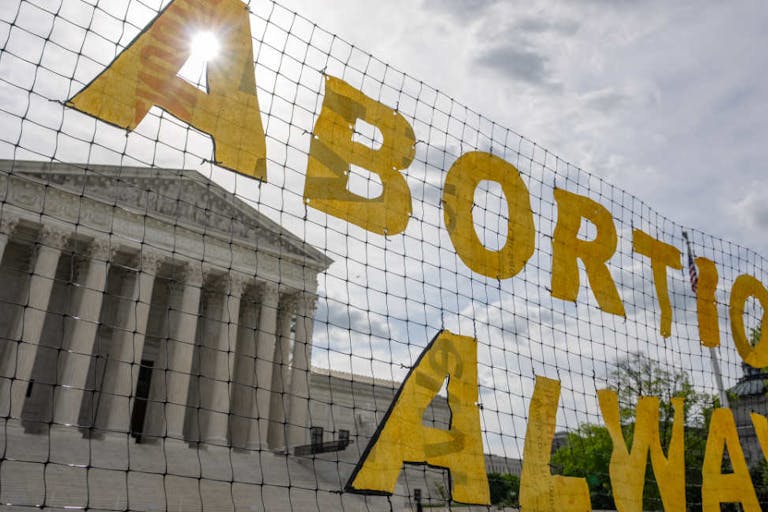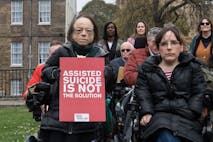
A growing number of Americans call themselves ‘pro-choice’ – but what’s really behind it?
Nancy Flanders
·
The problem with America’s pursuit of perfection
We are living in a society that is obsessed with perfection. Case in point: a bullied teenager wanted several plastic surgeries because she was being teased about her looks. But her mother couldn’t afford it. So how was this possible? Well, she received a grant from a nonprofit organization in New York City that provides free plastic surgery for children with deformities. That’s right: things like a big nose now evidently make you deformed.
Renata had been taunted so cruelly over her appearance that she stopped attending school altogether; she’s been home-schooled for the last three years.
“They were just calling me ‘that girl with the big nose,’” Renata told NBC News. “It just really hurts. And you can’t get over it.”
… The organization’s intent hasn’t changed since its inception: correcting low-income children’s facial deformities, such as a cleft lip, or facial palsy, says Romo. If a child seeks the gratis surgery simply because he’s being teased over his features, he won’t be chosen unless the problem meets the medical definition of a facial deformity.
… Romo believes that once the deformity is gone, the bullying will likely stop, too.
Renata was diagnosed by the foundation, Little Baby Face, as having hemi-facial microsomia. So she got a nose job and, for good measure, a chin implant. Another notorious case involved a girl, Nadia Ilse, whose ears were too big and thus pinned back. Ilse was also granted a nose job and a chin job, because apparently, it wasn’t just her ears that were “deformed.” These somehow are considered deformities. Meanwhile, a teenage boy, also being bullied, who had a small chin applied to the foundation, but he was declined because a small chin is considered cosmetic, and not a deformity. But big ears and a left-leaning nose, however, evidently qualify.
These cases are disturbing on multiple levels. Some of the cases the foundation takes on are certainly noble and worthwhile, such as repairing a child’s cleft lip or palate, or hearing restoration. But what does it say when we are evidently now telling bullied teenage girls with imperfect noses or big ears that not only are you “ugly,” but you’re actually deformed? Renata, for instance, had a mother who, instead of telling her that she was beautiful the way she was, agreed with the bullies and arranged for her to undergo multiple plastic surgeries. This foundation, in accepting multiple children who are victims of bullying because of their looks, is also agreeing with the bullies: yes, you are hideous; yes, you are deformed. Only plastic surgery will make you look normal and be confident and happy.
Article continues below
Dear Reader,
Have you ever wanted to share the miracle of human development with little ones? Live Action is proud to present the "Baby Olivia" board book, which presents the content of Live Action's "Baby Olivia" fetal development video in a fun, new format. It's perfect for helping little minds understand the complex and beautiful process of human development in the womb.
Receive our brand new Baby Olivia board book when you give a one-time gift of $30 or more (or begin a new monthly gift of $15 or more).
We are putting an unhealthy burden of perfection onto the shoulders of our children. Is it any wonder that children have eating disorders?
And when we expect such perfection out of our children, is it any wonder that any baby who might possibly fall short of such perfection is then aborted? In the U.K., for example, disturbingly high numbers of babies with cleft lips or palates and club feet are aborted. Many times, mothers whose babies are prenatally diagnosed with a disability like Down syndrome are pressured to have an abortion. And remember the family who, after being unable to conceive a child on their own, tried to pay their surrogate mother $10,000 to abort their unborn child over disability? It is a disturbing portrait of our society today and the lack of value we have for life. Rather than saying all children are beautiful and valuable and perfect as they are, we are saying that if you’re deemed ugly, you need major plastic surgery to be beautiful, and that if you have a disability, you don’t deserve to live at all.
Will there ever come a day that we can love and accept our children as they are? One can only hope.
Live Action News is pro-life news and commentary from a pro-life perspective.
Contact editor@liveaction.org for questions, corrections, or if you are seeking permission to reprint any Live Action News content.
Guest Articles: To submit a guest article to Live Action News, email editor@liveaction.org with an attached Word document of 800-1000 words. Please also attach any photos relevant to your submission if applicable. If your submission is accepted for publication, you will be notified within three weeks. Guest articles are not compensated (see our Open License Agreement). Thank you for your interest in Live Action News!

Nancy Flanders
·
Guest Column
Emily Berning
·
Opinion
Nancy Flanders
·
Opinion
Mark Wiltz
·
Opinion
Mark Wiltz
·
Pop Culture
Madison Evans
·
Analysis
Cassy Cooke
·
International
Cassy Cooke
·
International
Cassy Cooke
·
Politics
Cassy Cooke
·
Pop Culture
Cassy Cooke
·